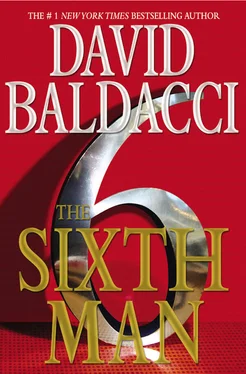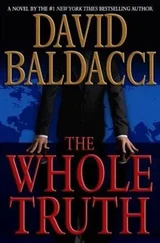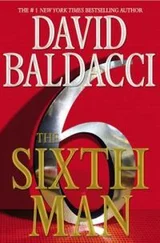“You said she visited the president?” asked Paul.
“Yes. It was an off-schedule meeting, so it must have been important because the president squeezed the time in.”
“Who else was there?”
“National security advisor.”
“Is he in Foster’s pocket too?”
“I believe they have an understanding,” replied Bunting. “One of mutual assured cooperation.”
“You don’t do an off-schedule with the president for anything less than the most critical reasons.”
Bunting said, “That’s right. What’s your best guess?”
Paul said, “She needed authorization for something. Something highly out of the ordinary that she was unwilling to stick her neck out for in the ordinary course of business.”
Bunting nodded. “I think you’re right.”
Sean said, “She’s DHS Secretary. According to you she’s already had four people killed, including an FBI agent. Hell, isn’t that out of the ordinary enough?”
“That was window dressing, Sean,” said Paul. “And don’t think I’m being callous. I know there are four people dead who shouldn’t be. But the blame for those deaths will be placed elsewhere, so in her mind they don’t even count. What Foster was probably going to the president for was explicit authorization for her to take extraordinary action on her own.”
Bunting added, “In other words, she asked for permission to terminate certain people.”
Sean looked incredulous. “Terminate certain people? Who?”
Paul said, “Eddie, Peter, and probably me.”
“Three American citizens?” said Sean. “You really think the president of the United States would ever authorize that?”
“Mr. Clean again,” said Paul. This time she didn’t smile.
“Bullshit. Okay, I know the government has people killed. Terrorists, known enemies of the country, the occasional rogue dictator.”
“We’re a problem for the country, Sean,” said Paul. “A serious problem. Eddie will never go to trial. Not with what he knows. If the president has bought the lie that Peter has had people killed, it’s not a stretch to believe he would lean toward termination. He wouldn’t want a murder trial where certain facts come to light which would be disastrous for America’s security. The president is the commander in chief. He has to wear many hats, but that’s the most important one. His number one priority is to keep America safe from her enemies. Wherever they might be.”
“So let’s assume that’s the case,” said Bunting. “Foster will get her answer. Let’s also assume it’s a go. She’ll waste no time executing the plan. What does she do first?”
“There’s little question in my mind about that,” said Paul.
“What then?” asked Sean.
“Eddie will not be at Cutter’s Rock much longer.”
Sean snapped, “You can’t possibly be thinking of breaking him out?”
“Oh, I won’t be the one doing the breaking.”
CHAPTER

68
MASON QUANTRELL’S AIDE UNLOCKED the door to the warehouse and Quantrell stepped through. Automatic lights came on and Quantrell blinked to adjust his pupils. The Mercury Group owned this facility, but the chain of ownership was buried so deep that not even an army of lawyers and accountants would be able to dig through to the truth. Every substantial private contractor to the government, particularly those operating in the defense and intelligence fields, had such complex business structures in place. It was a necessity. Prying eyes were everywhere, and all contractors had secrets they didn’t want either the government or their competitors to know about.
He eyed the column of black SUVs parked in the middle of the warehouse. He walked past them, evaluating each detail and coming away satisfied. In a corner of the facility a last planning meeting was taking place. All the men seated around the table stood when Quantrell approached.
The look in these men’s eyes was clear. They both feared and respected Quantrell, perhaps more fear than respect. Quantrell had never worn the uniform, never fired a gun on behalf of his country, but he knew how to make money supplying those who did. His main business model was hardware sales to the Pentagon. He didn’t build the planes, tanks, or ships, but he provided many of the overpriced accessories for them, like ammo, special fuel, missiles, guns, and surveillance and security gear. But he had determined long ago that the real money was in the soft side of war, namely intelligence. The profit margins there were huge, far larger than he had plying the traditional corridors of supporting the defense effort. And the world wasn’t always at war, not anymore. But they were always spying on each other, always.
He’d made billions off the soft side by following the old-school models. Lots of analysts, lots of reports that no one had time to read, feeding the competition among agencies that desperately wanted to score a victory at the expense of their sister agencies, even if it meant the actual goal of keeping the country safe was lost. Yes, he’d made a fortune, but it still wasn’t enough. And then Peter Bunting had arrived on the scene with a revolutionary model that would soon turn the intelligence-gathering world on its head.
Quantrell’s soft business had dwindled, and his anger and frustration had grown.
But now that was all about to change.
“Prepped and ready?” he said to the leader of the team.
The man replied, “Yes, sir, Mr. Quantrell.”
The team was comprised of elite foreign mercenaries who would do anything for money. They would never talk about what they’d done because that would kill their livelihood.
Quantrell asked the man some questions to judge whether they were indeed ready. He knew the plan better than anyone but came away satisfied at their level of preparation.
He left the warehouse, got back in his SUV, and was driven off. An hour-long plane ride later he was in D.C.
Though it was late he had another meeting. In his world those that relaxed simply were run over.
Ellen Foster was in her office at DHS. She was working late too. She often worked late. But now she was done. She was driven home surrounded by her security team. The pecking order in D.C. was often delineated by the size of one’s motorcade. The president was at the top, followed by the vice president. After that it was a far drop to the rest of the pack. But Ellen Foster was right there.
A man was waiting for her at her elegant home in upper-bracket northwest D.C. Around her lived prominent members of the Washington elite, both in the public and private sectors. He helped her off with her coat when she walked through the door.
“Give me a minute,” she told him.
She went upstairs and came back down a few minutes later. She had on the same clothes but had shed her hose and shoes. And she’d let her hair down.
They walked together into the old-fashioned drawing room of the nineteenth-century dwelling. She reclined on the sofa. She motioned for him to sit.
James Harkes sat.
Black suit, white shirt, black tie with nary a wrinkle. His face was impassive as he stared back at her.
“Would you like something to drink, Harkes?”
He shook his head. “No thank you.”
“Then can you make me a vodka tonic?” She pointed to the sideboard. “It’s all over there.”
He dutifully made the drink, handed it to her.
“Thank you.” She took a sip, nodded approvingly. “Very good.”
“You’re welcome.” His gaze went toward the window. “You’ve got a first-rate security detail. They’ve set their perimeter with a lot of thought. Your alarm system is top-notch, your door locks the best.”
Читать дальше













